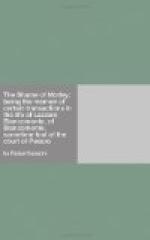The Tyrant of Pesaro, as I was soon to learn, was greatly taken with this fair cousin of his, whom that morning he had beheld for the first time. And being taken with her, it may be that Giovanni listened the more readily to her intercessions on my poor behalf. Since it was she who begged this thing, he could not wholly refuse. But since he was Giovanni Sforza, he could not wholly grant. He promised her that my life, at least, should be secure, and that not only would he pardon me, but that he would have his own physician see to it that I was made sound again. For the time, that was enough, he thought. First let them bring me back to life. When that was achieved, it would be early enough to consider what course this life should take thereafter.
And she, knowing him not and finding him so kind and gracious, trusted that he would perform that which he tricked her into believing that he promised.
For some ten days I lay abed, feverish at first and later very weak from the great loss of blood I had sustained. But after the second day, when my fever had abated, I had some visitors, among whom was Madonna Paola, who bore me the news that her intercessions for me with the Lord of Pesaro were likely to bear fruit, and that I might look for my reinstatement. Yet, if I permitted myself to hope as she bade me; I did so none too fully.
My situation, bearing in mind how at once I had served and thwarted the ends of Cesare Borgia, was perplexing.
Another visitor I had was Messer Magistri—the pompous seneschal of Pesaro—who, after his own fashion, seemed to have a liking for me, and a certain pity. Here was my chance of discharging the true errand on which I was returned.
“I owe thanks,” said I, “to many circumstances for the sparing of my life; but above all people and all things do I owe thanks to our gracious Lady Lucrezia. Do you think, Messer Magistri, that she would consent to see me and permit me again to express the gratitude that fills my heart?”
Mosser Magistri thought that he could promise this, and consented to bear my message to her. Within the hour she was at my bedside and divining that, haply, I had news to give her of the letter I had born her brother, she dismissed Magistri who was in attendance.
Once we were alone her first words were of kindly concern for my condition, delivered in that sweet, musical voice that was by no means the least charm of a princess to whom Nature had been prodigal of gifts. For without going to that length of exaggerated praise which some have bestowed—for her own ear, and with an eye to profit—upon Madonna Lucrezia, yet were I less than truthful if I sought to belittle her ample claims to beauty. Some six years later than the time of which I write she was met on the occasion of her entry into Ferrara by a certain clown dressed in the scanty guise of the shepherd Paris, who proffered her the apple of beauty with the mean-souled flattery that since beholding her he had been forced to alter his old-time judgment in favour of Venus.




